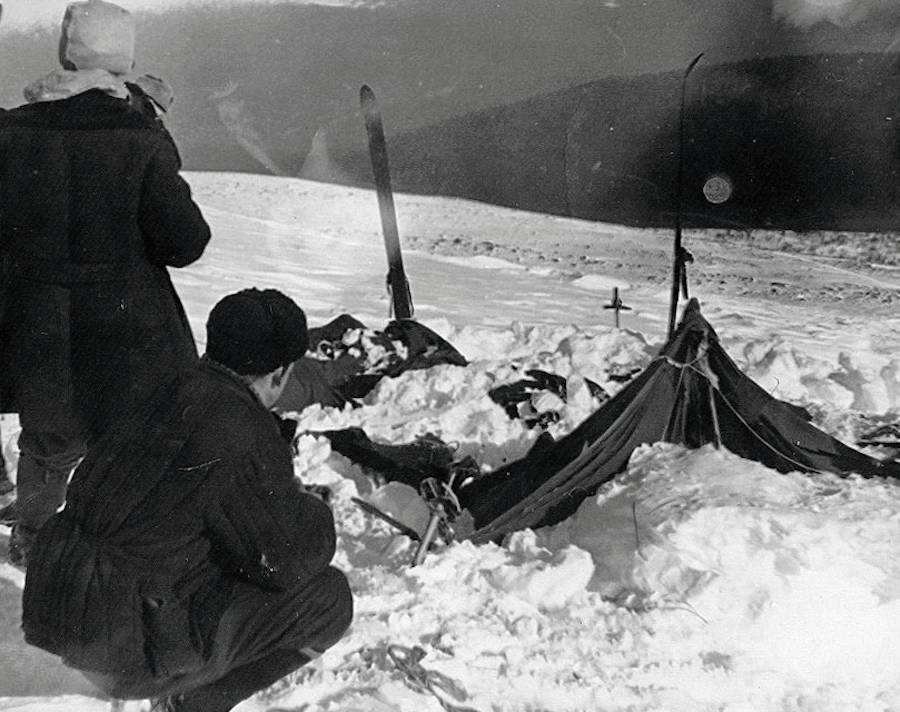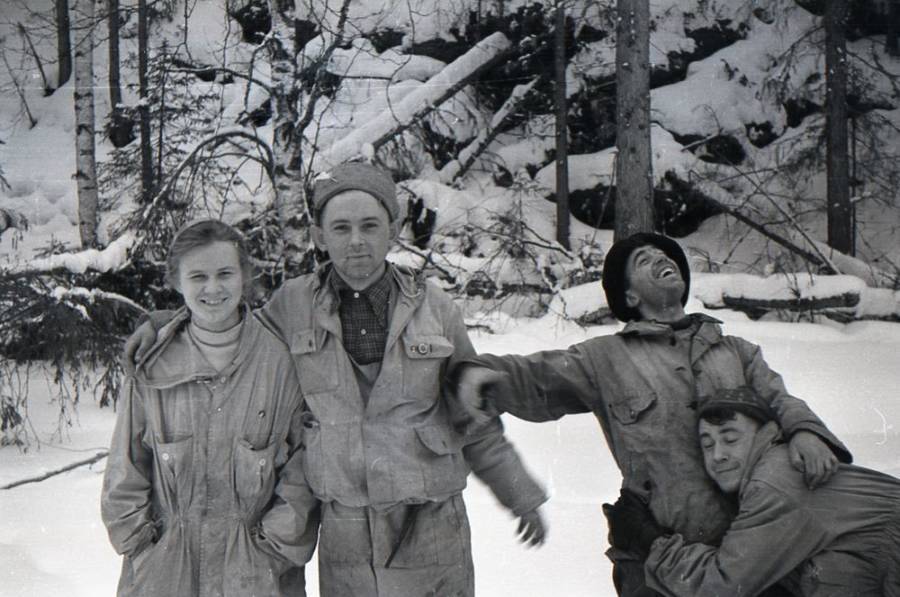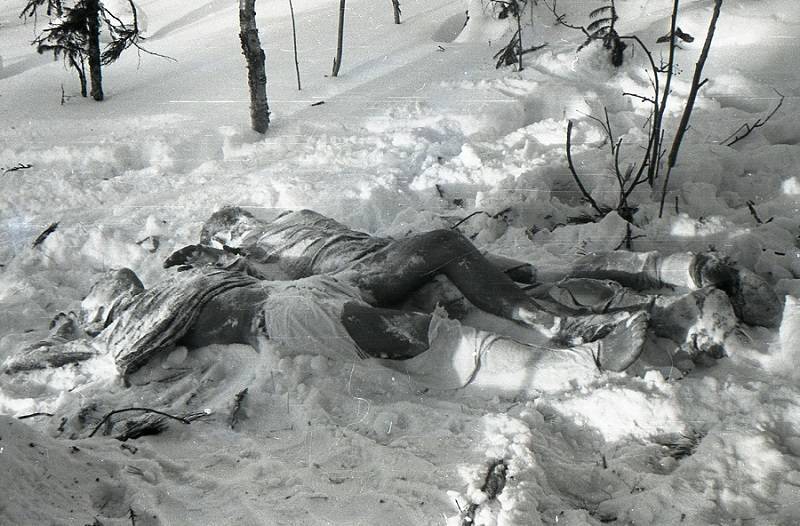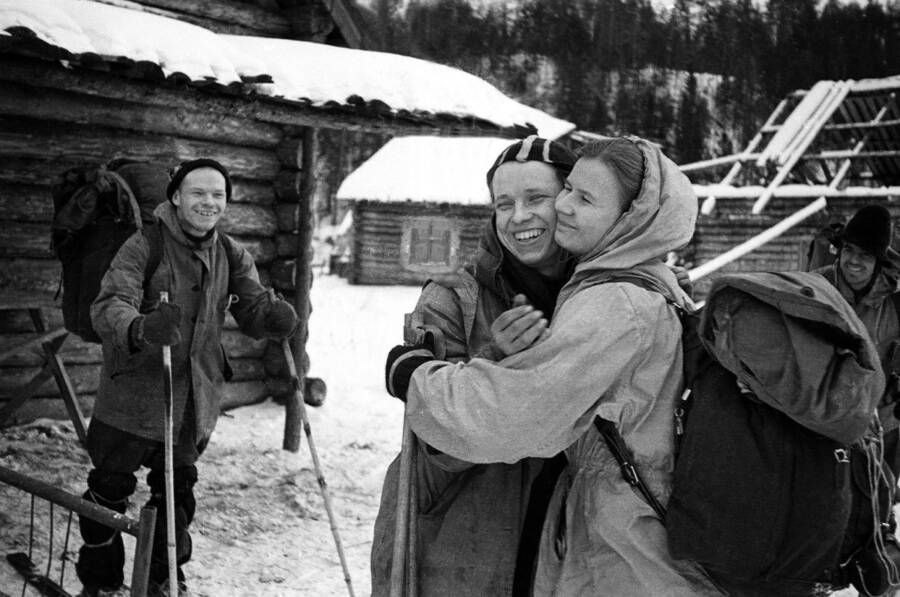For over half a century, investigators and amateur sleuths have puzzled over the bizarre deaths of nine Soviet hikers in 1959. But the solution may be tragically simple.
In January 1959, nine young skiers went on an adventurous hiking trip in Russia’s Ural Mountains. The hikers, many of whom were students at the Soviet Union’s Ural Polytechnic Institute, were found dead the next month. Their mysterious deaths would soon be known as the Dyatlov Pass Incident.
Only photographs of their final days, a confounding scene at their campsite, and bizarre autopsy results were left behind. The Dyatlov Pass Incident has since become a plentiful source of conspiracy theories, which range from government secrecy to paranormal phenomena — and for good reason.

Wikimedia CommonsThe destroyed campsite uncovered in the aftermath of the Dyatlov Pass Incident in 1959.
But then, in 2019, Russian officials reopened the bizarre case. Two years later, Swiss scientists took a deeper look at one of the leading theories.
But did these experts finally solve the enduring mystery of what happened to the hikers during the Dyatlov Pass Incident? Here’s what we know.
What Is The Dyatlov Pass Incident?

Yuri Krivonischenko’s CameraDyatlov Pass Incident victims Lyudmila Dubinina, Yuri Krivonischenko, Nikolay Thibeaux-Brignolle, and Rustem Slobodin.
In January 1959, a fifth-year student at Ural Polytechnic Institute named Igor Dyatlov led seven young men and two women on an expedition to cover 190 miles in 16 days across the northern Ural Mountains (one young man, Yuri Yudin, dropped out of the trip early on due to illness, a move that ultimately saved his life). They intended to reach a village called Vizhay. There, they would make contact via telegram after the conclusion of their journey.
But that never happened, and a search party for the missing group embarked on February 20th. What the search party found six days later baffled them: a tent that had been sliced open and the nearly naked dead bodies of hikers Yuri Doroshenko and Yuri Krivonischenko over a mile away.
Three more were found dead a few days later, including Igor Dyatlov. The other four bodies were discovered in spring when the snow had melted.

Russian National FilesThe bodies of Yuri Krivonischenko and Yuri Doroshenko.
Some of the hikers had suffered chest fractures so severe that they were comparable to injuries sustained in a car crash. One woman, Lyudmila Dubinina, was missing her tongue, eyes, part of her lips, and some of her facial tissue. There was also a fragment of her skull missing.
Though a criminal case had opened at the end of February that year, it ultimately concluded that a “spontaneous power of nature” had caused the hikers’ deaths. The Soviets kept the case classified until the 1970s, which had a snowball effect on the global interest in the ominous incident.
For over half a century, investigators continued to scratch their heads over just what exactly occurred during the Dyatlov Pass Incident.
Why Russia Reopened The Investigation Into The Dyatlov Pass Incident

Donat Sorokin/Getty ImagesRussian prosecutor Andrei Kuryakov at a press conference about the Dyatlov Pass Incident in Yekaterinburg in 2019.
In February 2019, the investigation into the Dyatlov Pass Incident was reopened in Russia. “Relatives, the media and the public still ask prosecutors to determine the truth and don’t hide their suspicions that something was hidden from them,” said Alexander Kurennoi, the official representative of Russia’s Prosecutor General, according to CNN.
Over the years, more than 75 theories have been put forward, ranging from alien abduction and an abominable snowman attack to radiation fallout from secret weapons tests and a conflict with the Indigenous Mansi people.
The 2019 investigation, however, took just three theories into account — ones exclusively limited to weather-related occurrences.
“All of them are somehow connected with natural phenomena,” said Kurennoi at the time. “Crime is out of the question. There is not a single proof, even an indirect one, to favor this [criminal] version. It was either an avalanche, a snow slab, or a hurricane.”

Wikimedia CommonsA memorial site for the nine hikers who died in the Dyatlov Pass Incident in Yekaterinburg, Russia.
A spokesman for the prosecutor’s office for Russia’s Sverdlovsk region presented a 400-page file of original case documents and materials at a press conference, alongside an announcement that one month later, prosecutors were to visit the Dyatlov Pass site itself with a crew of rescue workers and experts, including forensic professionals.
Petr Bartolomey, a friend of Dyatlov’s who attended the press conference, described his friend as “a wonderfully knowledgeable person, an athlete, always well-prepared… One could always rely on him.”
“I can say the same for the rest of the guys, although we did not go on as many expeditions as with Igor,” he said. “I am glad that, years after, a high-level investigation is resumed to understand what exactly happened.”
Why New Evidence May Have Finally Unraveled The Mystery

Russian National ArchivesThe Dyatlov Pass hikers saying goodbye to Yuri Yudin, who did not continue on the journey due to illness.
Ultimately, according to Live Science, the federal Russian investigation in 2019 (and another federal investigation in 2020) concluded that a slab avalanche — which involves a slab of snow breaking away from a deeper layer of snow and sliding downhill in large, block-like chunks — most likely sent the nine doomed hikers to their icy graves in 1959.
And in 2021, a study that was published by two Swiss scientists in the journal Communications Earth & Environment offered a scientific explanation for this leading theory. The theory had actually been suggested for years, but some people had remained skeptical of this explanation.
“A snow avalanche hypothesis was proposed, among other theories, but was found to be inconsistent with the evidence of a lower-than-usual slope angle, scarcity of avalanche signs, uncertainties about the trigger mechanism, and abnormal injuries of the victims,” the study authors wrote.
But as they went on to explain, there may have actually been evidence of a slab avalanche at the scene, which could have formed from the wind causing snow to accumulate on a slope near the hikers’ campsite.
The study identifies a combination of “irregular topography, a cut made in the slope to install the tent and the subsequent deposition of snow induced by strong katabatic winds” that may have led to the slab avalanche, creating severe yet non-fatal injuries to the hikers before they died of hypothermia.

Russian National ArchivesMany of the hikers were found with injuries similar to those sustained by car crash victims.
This would align with the autopsy results as well. In theory, the avalanche fell upon the hikers while they slept, forcing them to flee their tent in the cold night without much warning, which could explain why their bodies were found in various states of undress, with a litany of strange injuries.
“We do not claim to have solved the Dyatlov Pass mystery, as no one survived to tell the story,” lead study author Johan Gaume told Live Science. “But we show the plausibility of the avalanche hypothesis [for the first time].”
To put their theory to the test, the team created a simulation, based on weather reports from the time of the incident, to show how the avalanche would have come down on the hikers. And since the hikers were presumably lying flat on their backs while sleeping, a sudden slab of snow falling on them could have caused “severe but non-lethal thorax and skull injuries.”
Of course, this was all still just a theory. But it was the first time a truly scientific explanation had been put forward regarding the Dyatlov Pass mystery that actually held up against counterarguments.
It doesn’t explain every facet of what happened to those nine hikers back in 1959, such as why one hiker was missing her tongue (one potential explanation for that is that hungry wildlife happened upon her corpse). And even with this new study, the Dyatlov Pass case may never be fully closed. Still, this explanation does serve as a solid, logical counterargument to the many conspiracy theories that will continue to be put forward.
After reading about the most likely explanation for the Dyatlov Pass Incident, read about the cannibal couple accused of eating up to 30 people in Russia. Then, read about a solar observatory in New Mexico reopening amid speculation that aliens caused its closure.





